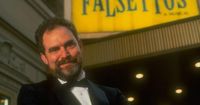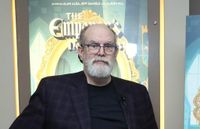William Finn, the acclaimed writer and composer known for his groundbreaking contributions to musical theater, passed away on April 7, 2025, at the age of 73 following a lengthy illness. His death was confirmed by his literary agent, Ron Gwiazda, and has left a significant void in the world of theater.
Born on February 28, 1952, in Natick, Massachusetts, Finn grew up in a Conservative Jewish household. He was deeply influenced by his upbringing, which shaped much of his work. Finn's early passion for musical theater blossomed during his time at Williams College, where he began composing music and was inspired by Broadway legend Stephen Sondheim. Finn's first musical, Sizzle, became the first original musical to run at Williams since Sondheim's time as a student there.
Finn's career took off in the late 1970s with the one-act musical In Trousers, which introduced the character Marvin, a closeted gay man grappling with his identity and family responsibilities. This work set the stage for a trilogy that would explore complex themes of love, family, and the AIDS crisis. In 1981, he followed up with March of the Falsettos, and in 1990, he completed the trilogy with Falsettoland. These three plays were later combined into the full-length musical Falsettos, which premiered on Broadway on April 29, 1992.
Falsettos was groundbreaking, not only for its portrayal of a gay family but also for its candid exploration of the AIDS epidemic. The musical was directed by James Lapine, who co-wrote the book with Finn. It received seven Tony Award nominations, winning for Best Original Score and Best Book of a Musical. Finn famously remarked during his acceptance speech, "Don’t do this, you’re making my mother cry in Boston," highlighting his deep personal connection to his work.
Following Falsettos, Finn continued to explore autobiographical themes in his musicals. In 1998, he and Lapine collaborated on A New Brain, inspired by Finn's own near-death experience after brain surgery to treat an arteriovenous malformation. This semi-autobiographical musical resonated with audiences, showcasing Finn's signature blend of humor and poignancy.
In 2005, Finn returned to Broadway with The 25th Annual Putnam County Spelling Bee, a whimsical musical about a group of eccentric children competing in a spelling contest. The show was a commercial success, earning six Tony nominations and winning two, including Best Featured Actor for Dan Fogler. It became a beloved staple for community theaters and schools, reflecting Finn's knack for capturing the voices of young characters.
Finn's other notable works include the song cycle Elegies, which he composed in response to the September 11 attacks, and the musical adaptation of the film Little Miss Sunshine, which debuted at the La Jolla Playhouse in 2011 and later made its Off-Broadway debut in 2013. His ability to weave personal and cultural narratives into his music set him apart in the theater community.
Throughout his career, Finn was committed to nurturing new talent in musical theater. He co-founded the Musical Theatre Lab at Barrington Stage Company and served as a faculty member at NYU’s Tisch Graduate Program in Musical Theater Writing, where he mentored a new generation of composers and lyricists.
Finn's work has been celebrated not only for its artistic merit but also for its ability to tackle significant social issues with wit and empathy. He often drew from his own experiences as a gay Jewish man, infusing his musicals with a distinct voice that resonated with audiences. His exploration of identity, family dynamics, and the human experience has left an indelible mark on the landscape of American musical theater.
Finn is survived by his life partner, Arthur Salvadore. His legacy will continue to inspire future generations of artists and theatergoers, reminding us of the power of storytelling and the importance of authenticity in art.









